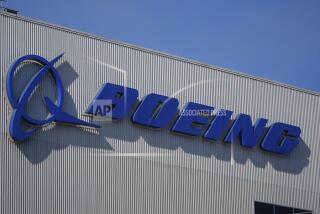Boeing Profit in Free Fall on 737 Retrofit
- Share via
Boeing Co.’s first-quarter earnings skidded 91% due to a previously disclosed charge related to production problems with new models of its flagship 737 jetliners, the company said Wednesday.
The Seattle company’s quarterly profit of $50 million--or 5 cents a diluted share--fell below the expectations of analysts, who had projected earnings of 6 cents per share, according to a survey by IBES International Inc. Last year, Boeing made $540 million in the first quarter, or 55 cents a share.
The earnings report sent Boeing shares down a mere 6 cents to close at $53 in New York Stock Exchange trading Wednesday.
Boeing’s revenue of $12.9 billion during the three months ended March 31 represented a 25% gain over the $10.4 billion the company took in during the first quarter of last year. But a $219-million after-tax charge--the result of more extensive retrofit activity for the next-generation 737 program than the company originally anticipated--took a toll on profits.
The charge is in addition to an after-tax charge of $437 million the company wrote off in the third quarter of last year for the 737 program. The company said it is too early to rule out further charges.
Boeing said its profit margins slipped due to production-line problems, pressure to keep prices down and the fact that most of the sales increase was in the new 777 and next-generation 737 lines. New aircraft models normally have lower profit margins.
Quarterly sales for the company’s information, space and defense systems programs--many of which are spread throughout Southern California--rose 10.5% compared with last year because of deliveries of military aircraft and Delta II launch vehicles, the company said. However, research and development costs associated with commercial space and communications activities and the Long Beach-based Sea Launch joint venture held down profit margins, Boeing said.
Analysts said there were no major surprises.
“It’s more a reflection of their continuing to muddle along in this period of uncertainty,” said Jon Kutler, president of Quarterdeck Investment Partners, a Los Angeles-based investment bank that focuses on the aerospace industry.
In a conference call with analysts, Boeing Commercial Airplane Group President Ron Woodard said the formal roll-out for the new 100-seat Boeing 717 plane--which is made in Long Beach--has been pushed back from May 18 to June 10. Warren Lamb, a Boeing spokesman in Long Beach, attributed the delay to scheduling problems that prevented company executives and potential customers from attending on the original date.
However, tests of the 717 engines being built by BMW and Rolls-Royce in Germany turned up cracks in some of the engine’s compressor blades, which has forced the company to delay its first flight from June to the end of the summer, Lamb said.
Atlanta-based AirTran Airlines is scheduled to take delivery of the first of 50 717s in June 1999, but Lamb said it is too soon to know how long that will be delayed.
Paul Nisbet, senior aerospace analyst with JSA Research in Newport, R.I., said the delays should not affect Boeing’s ability to sell the 717 to additional airlines.
“It could push back the signing of orders, but I don’t think they’re likely to lose any,” he said.
Separately, Boeing’s Douglas Products Division in Long Beach said Wednesday that FDX Corp. ordered three MD-11 freighters, whose list price is between $129 million and $144 million apiece. The company also confirmed that Trans World Airlines has ordered 24 MD-83 planes worth about $1.1 billion.
Times wire services contributed to this report.
More to Read
Inside the business of entertainment
The Wide Shot brings you news, analysis and insights on everything from streaming wars to production — and what it all means for the future.
You may occasionally receive promotional content from the Los Angeles Times.











